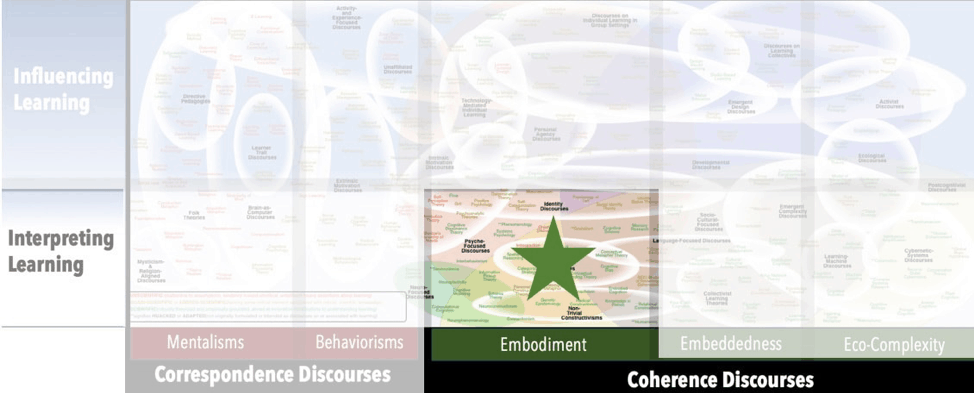Focus
Leaps in abilities to perceive and interpret complex situationsPrincipal Metaphors
- Knowledge is … expert-level skill and interpretation
- Knowing is … ability, expertise
- Learner is … a novice (individual)
- Learning is … improving, extending
- Teaching is … modeling, coaching
Originated
1950sSynopsis
Chunking refers to any process associated with reducing the demands on individual consciousness by collecting bits of information into larger, meaningful wholes. In the Expert–Novice literature, Chunking is often identified as key difference between experts, who are able to see complex phenomena (e.g., musical scores, team sports, chess positions) as coherent wholes, and novices, who typically experience the same sorts of phenomena as collections of independent pieces. Associated discourses include:- Chunking Theory (W.G. Chase & H.A. Simon, 1970s) – the suggestion that Chunking is the principal means by which experts by-pass biological constraints on perception and conscious awareness
- Data Chunking (Allen Newell, 1980s) – involving the recall of “data chunks” – that is, the attributes of an object – outside the context where that object was encountered
- Template Theory of Expertise (Fernand Gobet, 1990s) – a theory that invokes Chunking to explain expertise in terms of combining well-developed chunks into larger and more sophisticated “templates”
Commentary
While Chunking has been established as necessary to the development of expertise, it appears to be a complex process that can be supported but cannot be caused. The critical factor in its development is a sufficiency of experience that prompts a qualitative shift in a knower’s abilities to perceive, interpret, and act in/on situations – and the extents and natures of experience that might constitute such a sufficiency vary dramatically among knowers. Phrased differently, although there is a broad consensus that Chunking is a core element of human learning, it may be too knower-specific to be useful in most contemporary models of formal education. (Part of the issue here may be that most contemporary models of education are tethered to an assumption that one accumulates knowledge in a quasi-linear way. Chunking, in contrast, only makes sense if a nonlinear, fractal-like, chunks-chunking-into-larger-chunks image of knowledge development is embraced.)Authors and/or Prominent Influences
DiffuseStatus as a Theory of Learning
Chunking is a principle of learning.Status as a Theory of Teaching
Many efforts have been made to translate Chunking into a principle of teaching. Some success has been met (e.g., a widely employed tactic to improve chess playing is engaging with many, many simplified positions on a chess board). However, the notion is not well fitted to models of schooling that are constrained by time pressures, unnuanced practice, and fragmented curricula.Status as a Scientific Theory
Chunking is a well-documented phenomenon that has been demonstrated to be a core element of human functioning. Among human endeavors where intense focus, extensive practice, and expert teaching are available, it has been demonstrated that the development of Chunking can be greatly accelerated.Subdiscourses:
- Chunking Theory
- Data Chunking
- Template Theory of Expertise
Map Location

Please cite this article as:
Davis, B., & Francis, K. (2021). “Chunking” in Discourses on Learning in Education. https://learningdiscourses.com.
⇦ Back to Map
⇦ Back to List
